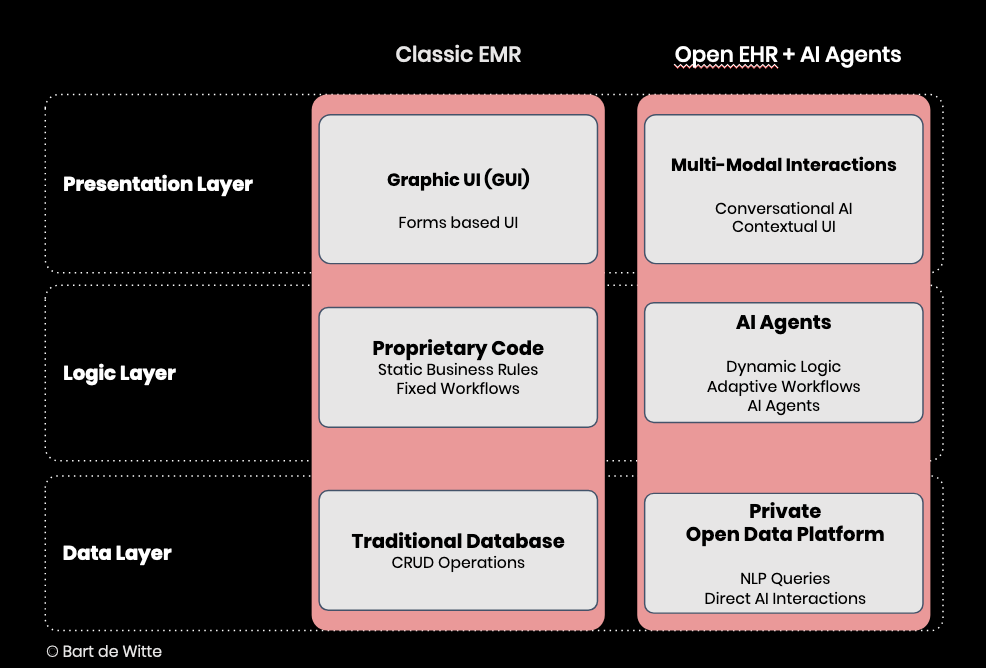Why Classic EMR Vendors Will Be Replaced by openEHR and AI Agents Architectures
A transformative wave is sweeping through healthcare, powered by the democratizing forces of open-source AI and a growing resistance to monopolistic control. Let's explore how this revolution is unfolding and why it matters for everyone involved in healthcare, from doctors and nurses to patients and innovators. Traditional Electronic Medical Record (EMR) systems, you know, the ones that make both doctors and patients want to pull their hair out, are living on borrowed time. They're like the taxi industry right before ridesharing came along: ripe for disruption. In this newsletter, I will explore why classic Electronic Medical Record (EMR) vendors will be replaced by openEHR and AI agents architectures.
The Problem: Monolithic Giants Blocking Innovation
Imagine you're a brilliant healthcare startup with an AI solution that could save doctors hours of work each day. There's just one towering obstacle in your path: the existing Electronic Medical Record (EMR) systems that dominate healthcare IT. In the United States, a single company, according to many different sources, Epic, controls the medical records of up to 94% of the population. While Europe's landscape is more fragmented, the story remains similar – large, inflexible EMR systems act as gatekeepers, deciding which innovations reach healthcare providers.
These traditional EMR systems have become more than just software; they're the primary interface through which healthcare professionals interact with technology. Unfortunately, they've also become barriers to progress, suffering from several critical limitations:
Think of these EMR systems as ancient cities with high walls and no gates. Inside, valuable medical data sits in isolated silos, unable to flow freely between different systems. The systems speak different languages (data formats), making communication nearly impossible. They're as rigid as concrete, struggling to adapt to the rapidly evolving needs of modern healthcare. And perhaps most frustratingly, they lack the sophisticated analytical capabilities needed to derive meaningful insights from the vast amounts of data they hold.
The situation has become so problematic that we're seeing legal challenges emerge. Consider the recent case of Particle Health, which filed an antitrust lawsuit against Epic Systems, alleging that the company uses its market dominance to suppress competition and innovation. This represents a breaking point in the industry's tolerance for monopolistic control.
Enter the Dynamic Duo: openEHR and AI Agents
Enter openEHR, a revolutionary approach to healthcare IT that embodies the same spirit of collaboration and innovation that drove the open-source software movement. Think of openEHR as building a new city with modern infrastructure, one where data flows freely, systems can easily connect and communicate, and innovation is welcomed rather than blocked.
Leading this charge are companies like Better, Vitagroup, Cambio and Code24 and Medblocks. They're creating flexible, modular systems that can evolve alongside healthcare's changing needs. But openEHR is just one part of the equation.
The other revolutionary force is AI agents, intelligent systems that promise to fundamentally change how healthcare professionals interact with technology. As Microsoft CEO Satya Nadella recently observed, we're witnessing a shift where traditional user interfaces will give way to AI agents that can understand and respond to natural language, automate routine tasks, and provide intelligent insights.
Imagine a world where instead of clicking through endless dropdown menus and checkboxes, healthcare providers can simply speak naturally to AI assistants that understand medical context, automatically document patient encounters, and provide real-time decision support. This isn't science fiction – it's the near future of healthcare IT.
The Old Guard is Crumbling - The Path Forward
The convergence of openEHR and AI agents represents more than just a technological upgrade, it's a fundamental reimagining of healthcare information systems.

This new paradigm promises to:
- Free healthcare providers from the burden of administrative tasks, allowing them to focus more on patient care
- Enable seamless sharing of medical information across different systems and institutions
- Foster innovation by creating an open ecosystem where new AI-powered tools can be easily integrated
- Improve patient outcomes through more sophisticated data analysis and personalized care recommendations
Given these advantages, it's puzzling to see major healthcare institutions like Berlin's Charité still opting for an EMR behemoth like Epic. The future clearly lies in more flexible, open architectures that can embrace rather than resist innovation.
The Time is Now
We're at a unique moment in healthcare IT history. The convergence of openEHR's maturity, rapid advances in AI technology, and growing frustration with traditional EMR systems creates perfect conditions for transformation. However, realizing this potential requires careful orchestration and new technological bridges, exactly why together with my co-founder Mandana Ahmadi a serial founder with a PhD in computational neuroscience we have founded Isaree. and of course we are interested in working with selected clients who share this vision, so we can build together.
While we are in stealth mode and we can't share details of our work yet, we're excited to push the future of healthcare IT to an entirely new paradigm that can evolve and improve continuously and is based on openness. For healthcare providers, technology vendors, and most importantly, patients, this transformation promises a future where healthcare technology finally lives up to its potential to improve care, reduce costs, and enhance the experience of everyone involved in the healthcare journey.
Feel free to contact me if you are interested to collaborate or even invest.
Bart
